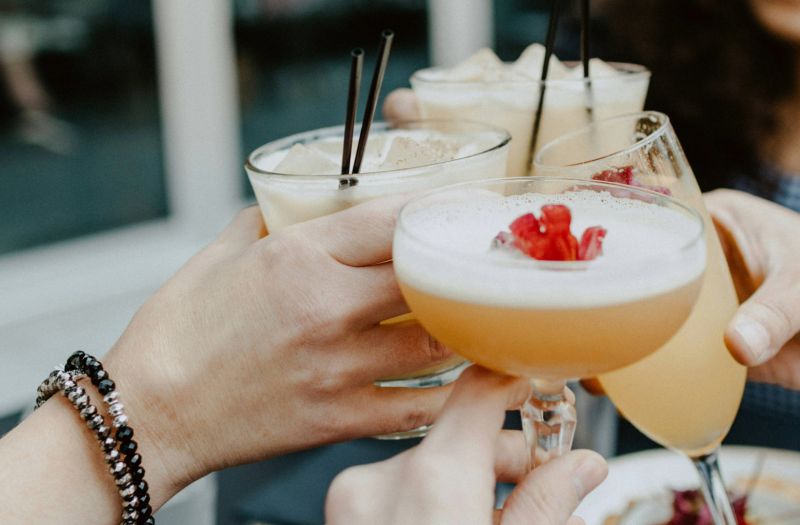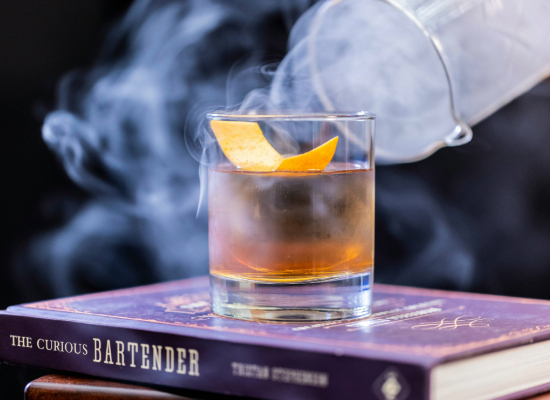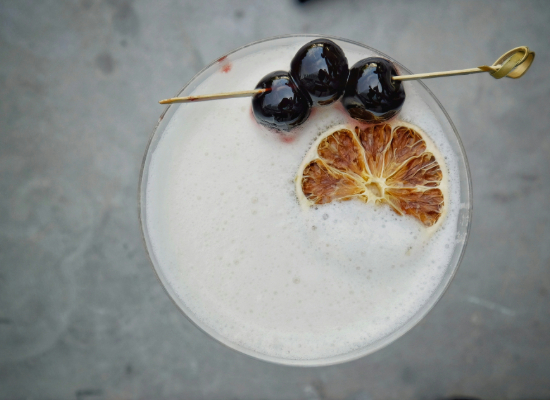Educating Bartenders Worldwide.
By Beverage Trade Network

The world of mixology continues to evolve, with bartenders constantly seeking new ways to elevate the drinking experience. As consumers’ tastes grow more adventurous, innovative techniques are becoming essential tools in a bartender's arsenal. These techniques not only expand the flavor profile of spirits but also introduce new textures, aromas, and visual elements that surprise and delight patrons. Bartender Business explores the various cutting-edge methods shaping the future of cocktail creation.
In order to provide a rich and savory flavor to spirits like whiskey or rum, fat from bacon, butter, or other ingredients is infused into the spirit. The mixture is frozen to solidify the fat and then strained to produce a smooth liquor with a unique flavor character. This technique enhances the spirit's complexity, giving it a distinct and indulgent profile that pairs well with bold cocktails.
It is the process of eliminating particles and cloudiness from a cocktail, resulting in a drink that is clear and transparent. This is often accomplished by utilizing a procedure known as "gel filtration," in which the cocktail is combined with a clarifying agent such as agar-agar or egg whites. The mixture is then slowly filtered, resulting in a clear, visually pleasing beverage with a smoother texture and refined flavor.
Flavors are infused into spirits by heating the ingredients in a vacuum-sealed bag at a low, controlled temperature in a water bath. This approach enables the precise extraction of tastes from herbs, fruits, spices, or other botanicals without the harshness of traditional procedures such as heat or alcohol evaporation. The end result is a smooth, well-balanced infusion with fully integrated flavors, producing a more nuanced and vivid profile.
[[relatedPurchasesItems-31]]
This technique uses liquid nitrogen for quickly infusing tastes into liquids, such as spirits or cocktails. This procedure exposes the liquid to extremely low temperatures, causing it to become supercooled. When the nitrogen is released, it causes bubbles and cavitation in the liquid, which aids in the extraction and infusion of flavors from substances like fruits, herbs, or spices in only seconds. This approach improves the infusion's aroma and taste profile while keeping the basic spirit or liquid intact.
This advanced process for obtaining very concentrated and accurate tastes in spirits or cocktails entails evaporating liquid under low pressure while gently rotating it in a hot water bath. The reduced pressure reduces the boiling point of the liquid, allowing delicate flavors to be extracted without heat-induced deterioration. The vapor is then condensed and collected, yielding a clear, flavorful extract. This method is often used for infusing distinctive botanical or fruit essences, allowing mixologists to create complex, personalized tastes that improve the drinking experience.
Also read: Bartender Hacks You Need to Know
Creating fizzy and effervescent beverages gives drinks a dynamic texture and a compelling sensory experience. Using soda siphons or CO₂ canisters, bartenders can experiment with sparkling cocktails and carbonated fruits. The process not only improves visual appeal but also enriches the flavor experience by increasing aromatics and refreshing acidity, making it a flexible technique in current mixology.
Infusing drinks with smokey scents increases depth and complexity, resulting in a memorable sensory experience. You can expose the components or finished cocktails to wood chips, herbs, or other combustible elements using a smoking pistol or cloche. The smoky flavor profile can range from subtle to robust, complementing spirits such as whiskey, mezcal, or rum while giving a visually appealing appearance that engages both the palate and the senses.

Image Title: Infusing cocktails with smoky flavors
Cocktails aged in barrels create rich, complex tastes as the liquid interacts with the wood over time. This process adds depth to the drink with oak, vanilla, and spice flavors while also providing a smoother, more balanced character. This method is ideal for spirit-forward cocktails such as Negronis and Old Fashioneds, adding a refined touch of expertise that enriches the drinking experience.
Adding foams to cocktails creates a distinct textural aspect that improves both visual appeal and flavor. Culinary techniques such as a gas-charged siphon or the combination of stabilizing chemicals typically form these light layers, which can combine a variety of flavors, from citrus to herbs. Beyond aesthetics, they provide concentrated smells that engage the senses and lend a modern, sophisticated touch to cocktail presentations.
This process converts liquids into fragile, gel-like spheres that mimic caviar and provide a blast of flavor when bitten. The procedure uses sodium alginate and calcium chloride to encapsulate juices, syrups, or other flavored liquids, allowing for unique and amusing cocktail garnishes. Spherification provides an engaging and visually appealing element to drinks, increasing the guest experience through surprising texture and flavor delivery.
Also read: 5 Ways To Enhance Your Bartending Experience
This method employs pressure to accelerate the infusion process, allowing flavors to be introduced into spirits or other liquids nearly immediately. Typically produced with a nitrous oxide-charged cream whipper, it works by forcing the liquid to absorb the flavors of herbs, fruits, spices, or other substances in a matter of minutes. Rapid infusion is great for producing one-of-a-kind cocktails or experimenting with new flavor combinations on the fly, making it a favorite among mixologists who value originality and efficiency.
This technique involves utilizing a vacuum pot to extract flavors from components in a slow, controlled manner. The liquid is heated and circulated through the ingredients under reduced pressure, resulting in a smooth and deep infusion. The vacuum preserves delicate flavors and aromas that might otherwise be lost in standard infusion procedures, making it excellent for infusing spirits with sensitive botanicals or herbs. Percolation can also be utilized to generate distinct flavor profiles for cocktails, adding a sophisticated element to a bar's offerings.
This method uses high pressure or heat to quickly infuse flavors into a liquid, significantly shortening the time required by typical infusion methods. By subjecting the liquid to quick changes, such as using an iSi whipper or heat-based instruments, the constituents unleash their flavors practically immediately. Flash infusion is especially beneficial for producing fresh, bright flavors in cocktails, allowing bartenders to experiment with combinations that might otherwise take hours or days to perfect. This approach improves efficiency without losing taste.
Ingredients are dehydrated to concentrate flavors and create novel experiences. It is suitable for making powdered garnishes, fruit chips, and fragrant cocktail powders. Bartenders can enhance the intrinsic flavors of items by gently removing water with low heat or a food dehydrator. This method allows you to add gorgeous garnishes or complicated flavors to your drink without diluting it.

Image Title: Cocktail made using the foaming and dehydration techniques
It entails infusing alcohol with herbs, spices, fruits, or other botanicals in order to extract and concentrate their flavors. The components are often steeped in high-proof alcohol for many weeks to extract the botanical aroma. The end result is a strong flavor extract that can be utilized to enhance the depth and complexity of cocktails.
As mixology continues to evolve, these innovative techniques offer bartenders the opportunity to create truly unique and memorable cocktails that engage all the senses. By experimenting with the above methods, mixologists can enhance flavor complexity, texture, and visual appeal, providing guests with an unforgettable drinking experience.
Header image sourced from Unsplash
Related Links
How To Promote Happy Hours For Good Sales?
Glassware 101: Why Different Spirits and Cocktails Use Different Glasses